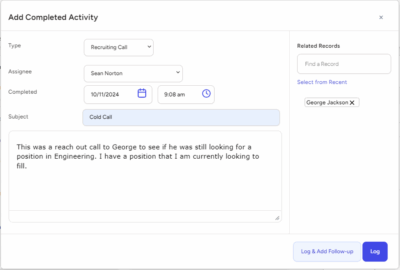If you’re a recruiter or search consultant, then you’re well aware of the fact that there are multiple objectives of recruitment during the hiring process. However, not all recruitment objectives are created equal. Just like everything else, some are more important than others.
And it would make sense that the ones that are the most important are the ones that lead most directly to success. In the case of a corporate recruiter or HR professional, that success is represented by hiring the best candidate for the position. For a professional recruiter or search consultant, that success is represented by a successful placement of the best candidate for the position with the client that engaged their services for the search in the first place.
But back to where we were. What are the most important objectives of recruitment during the hiring process? Which recruitment objectives are going to lead most directly to the success that we just referenced?
Objectives of recruitment vs. time
Good questions. To help us answer them, we’re going to enlist the expertise and extensive experience of Terry Petra, one of the recruiting industry’s leading trainers and business consultants. Petra is fond of a particular quote when it comes to recruiting and hiring process, regardless of what kind of recruiter you are. That quote is from the book Winning Through Intimidation by Robert J. Ringer:
“As a general rule, you should assume that time is always against you when you’re trying to make a deal—any kind of deal.”
Those words are absolutely as true now as when the author wrote them way back in 1973. (The more things change, the more things stay the same.) The problem is that not everybody involved in the recruiting and hiring process is necessarily moving with a sense of urgency. If you’re a corporate recruiter or HR professional, then perhaps the job candidates aren’t moving with a sense of urgency, especially your top candidate. If you’re a professional recruiter or search consultant, then perhaps the hiring manager or other decision maker is not acting with a sense of urgency . . . in addition to job candidates.
You can see why recruiting is so challenging.
“Companies have to move quickly if they hope to successfully compete for the most sought-after talent,” said Petra. “As one recruiter stated, employers fit into one of two categories: ‘the quick . . . or the dead.’”
However, there is such a thing as going too fast. After all, you don’t want to compromise the integrity of the entire process by making mistakes or costly oversights. As the old adage goes, you can’t choose between doing it fast or doing it well . . . you have to do it both fast and well!
According to Petra, timing is everything.
“If the hiring process moves too slowly, the candidate may lose interest or pursue other alternatives,” he said. “On the other hand, if the hiring process moves too quickly, the candidate may not be ready to accept an offer and in fact, could turn it down because they feel pressured to make a premature decision.”
The last thing that anybody wants—corporate recruiter, HR professional, search consultant—is for a job candidate to turn down the offer. The logic is simple. You can hire somebody who does not want to accept the offer of employment. So to ensure that the offer is accepted, a recruitment process must accomplish a minimum of two objectives.
#1—Balanced candidate evaluation
According to Petra, this evaluation must accurately measure multiple criteria. These criteria include the following:
- The candidate’s capability to do the job
- Their willingness to do the job (which is a separate matter altogether)
- Their ability to positively interact with management, peers, and subordinates
In short, you can not ensure that you’re hiring the right person for the position if your evaluation of the candidate does not include these three specific and distinct areas.
#2—Candidate’s willingness to join the organization
This is where company culture and employer branding enter the picture. An organization (and any recruiter working for said organization) must brand the employer in a positive ways. And this is not just during the recruiting and hiring process. This is an objective of recruitment that is non-negotiable. No matter how good the job itself is, if the candidate does not feel compelled to work for the organization, then it doesn’t matter how good the job is.
In terms of the objectives of recruitment, these are the two most important. Without them, no job candidates are hired and not placements are made. And that’s sad news for just about everybody involved with the process.








